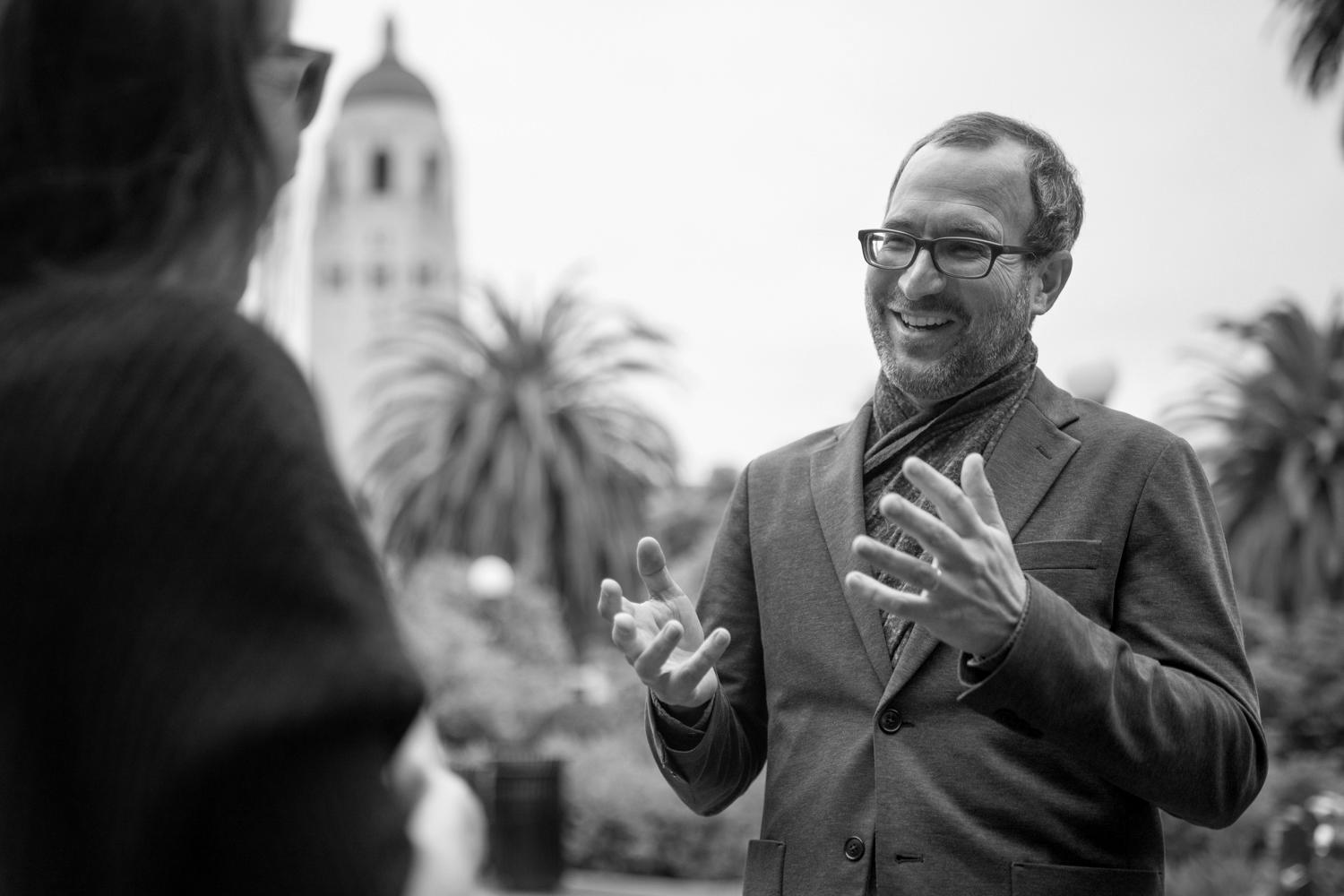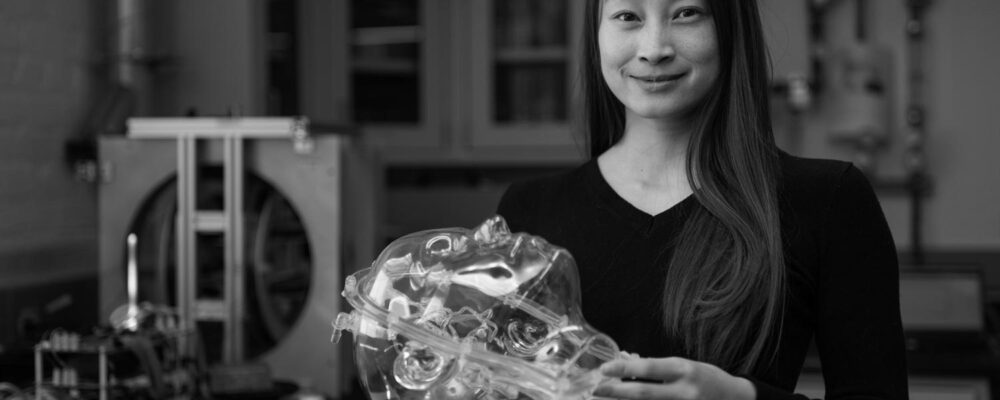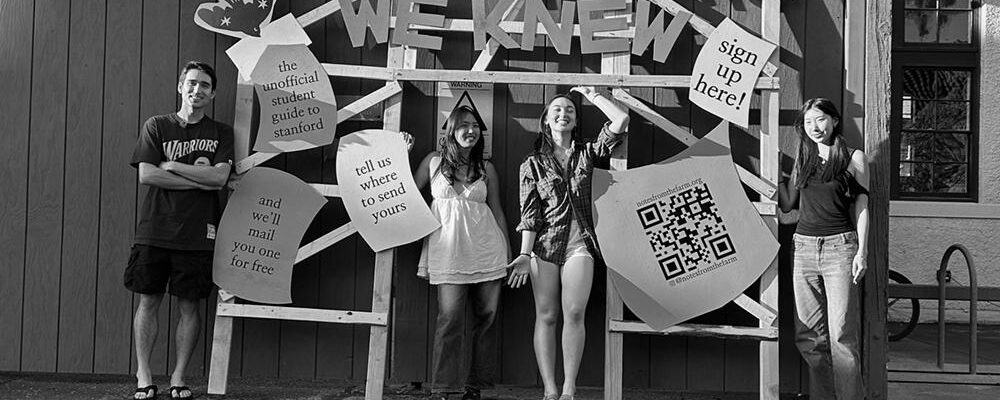In this year’s Citizenship in the 21st Century course, students explored political differences by talking openly with each other.
It sounds simple. But in a world where polarization is deep and emotions are high, finding spaces for meaningful conversations across divides can be difficult. What if it didn’t have to be?
Providing students with the setting and the skills to engage in rigorous, intellectual discussions on topics that can be contentious – controversial, even – is one of the goals of Stanford’s first-year undergraduate requirement program, Civic, Liberal, and Global Education (COLLEGE).
“We want students to be excited when they meet somebody who disagrees with them, because it’s an opportunity to learn,” said Dan Edelstein, the Nehal and Jenny Fan Raj COLLEGE Director. Edelstein was one of 45 instructors leading 83 sections of Citizenship in the 21st Century, the second course in COLLEGE’s three-quarter sequence designed to critically engage students with ideas that shape themselves and the world.
In Citizenship in the 21st Century, students consider what makes self-governance possible in a pluralistic democracy.
“Students are always bringing new insights drawn from their varied perspectives, values, and experiences to bear on some really important and timeless questions,” said Dustin Schroeder, the COLLEGE program’s faculty director on civic education. “People disagree and they hold very different intellectual and disciplinary commitments, but our community of faculty and lecturers is committed to building an intellectual space where people can deeply and openly engage with each other’s ideas.”
Voicing differing views
Twice a week, about 1,200 Stanford frosh gathered in small, seminar-style classes to explore what a civic identity means in a liberal democracy.
The syllabus ranged from classic political philosophers like Plato and Thomas Hobbes to more contemporary materials – news and film clips, literary fiction, speeches, and poetry. This year, it was modified to include Stanford’s own tradition of cultivating citizenship, beginning with discussion of the Fundamental Standard. Established in 1896 as a code of conduct for Stanford students, it states: “Students at Stanford are expected to show both within and without the University such respect for order, morality, personal honor and the rights of others as is demanded of good citizens.”
“The language of citizenship is baked into the mission of the university,” Edelstein said.
From the start of the course, students reflected on how their openness, curiosity, and respect underpin Stanford’s academic mission. The course modeled what full participation in such a community looks like.
“Listening to differing views and acknowledging your own possibility for error are central to learning, and to participating in the life of your community,” said Jay Hamilton, the Freeman-Thornton Vice Provost for Undergraduate Education, who also led a section this year.
Students discussed the importance of freedom of expression and why universities sometimes impose time, place, and manner restrictions.
In the second week, students examined recent campus speech controversies.
For example, they read a 2023 memo written by Provost Jenny S. Martinez when she was dean of the Stanford Law School, which discussed protests disrupting Judge Kyle Duncan’s speech at a student Federalist Society event. They also read a 2023 article by Stanford Professor Jay Bhattacharya, who is currently serving as director of the National Institutes of Health, about his experiences with institutional orthodoxy during the COVID-19 pandemic.
“We want our students to recognize that these are not abstract questions. These are topics that will come up in their lives,” Edelstein said.
The goal, Edelstein emphasized, wasn’t to relitigate COVID-19 practices but to balance the complexities that emerge when there is limited knowledge about an evolving problem – in this example, a pandemic – with protecting and serving society. One prompt he posed: What kind of speech policy would they want?
“That’s a tricky question because it forces us to balance competing values,” Edelstein said.
To frame these discussions, students read excerpts from John Stuart Mill’s On Liberty, particularly his “harm principle,” the idea that speech should only be limited to prevent physical harm. Students debated whether Bhattacharya’s experiences fit this framework.
“Discussing whether the harm that Bhattacharya alleges meets Mill’s principle is a helpful exercise because it’s ambiguous,” Edelstein said. “There’s a reasonable case to be made on both sides.”
Students came to appreciate the value of grappling with opposing views. As Mill famously wrote, “He who knows only his own side of the case knows little of that.”
Studying complexity, collaboratively
Throughout the quarter, students tackled complex questions: Who should be included in citizenship? How has citizenship evolved? How have groups historically excluded from citizenship advocated for their rights?
They also explored ethical dimensions of citizenship – such as justice, fairness, and cooperation – which often intersect with personal experiences and emotions.
For Misbah Aziz and John Hurlbut, students in Edelstein’s seminar, the highlights included the meaningful and open discussions they had around these issues.
“The class was run in a way that opened the floor for students to bring in different ideas and have them justly considered,” Hurlbut said. “The way I viewed these discussions is that we are working together to find the truth.”
“People were able to say their opinions without anyone shutting them down,” Aziz said.
Respect, Hurlbut added, was crucial: “You’re never going to convince anybody unless you come with a positive attitude and make it a conversation instead of a yelling match.” He noted that building trust over time was essential for rich dialogue.
To help foster this, Edelstein drew on Aristotle’s peripatetic teaching tradition: students paired off and walked around campus – often the Main Quad – while discussing prompts Edelstein gave them, such as how national history shapes their own sense of citizenship.
People were able to say their opinions without anyone shutting them down.”
Misbah Aziz
“I think that it is helpful for everyone to understand that people hold their beliefs for a reason and to understand what those reasons are,” Aziz said.
“Opinions didn’t always change,” Hurlbut added, “but we each understood the other side more.”
Learning about themselves, too
Students were also encouraged to examine their own assumptions. The goal was not to change minds, but to deepen understanding and appreciate complexity.
“Sometimes, we hold beliefs we don’t ever question,” Aziz said.
Through discussions, Aziz realized the importance of explaining her views clearly and using evidence to persuade others. “Being able to say aloud what my opinions are helped me process the way I see the world,” she said.
Dialogue isn’t limited to COLLEGE classrooms. In 2024, ePluribus Stanford was launched to identify opportunities to expand civic engagement, critical inquiry, and constructive dialogue across campus. In tandem with Citizenship in the 21st Century, a series of events, called “Civic Salons,” were held in residence halls across campus and offered students further opportunities to explore civic topics.
COLLEGE instructors also received training in constructive dialogue, based on a model developed by Stanford Law School Professor Norm Spaulding.
In addition, the Stanford Civics Initiative provides students with ways to continue exploring the concepts they discussed in Citizenship in the 21st Century in their upper-class courses.
“},”imageData”:null}”>
Creating a culture of constructive dialogue
COLLEGE was launched in fall 2021 and is in a pilot phase through the 2025-26 academic year. It replaces the Thinking Matters requirement. The program aims to prepare students for meaningful conversations throughout their time at Stanford and beyond.
Dialogue isn’t limited to COLLEGE classrooms. In 2024, ePluribus Stanford was launched to identify opportunities to expand civic engagement, critical inquiry, and constructive dialogue across campus. In tandem with Citizenship in the 21st Century, a series of events, called “Civic Salons,” were held in residence halls across campus and offered students further opportunities to explore civic topics.
COLLEGE instructors also received training in constructive dialogue, based on a model developed by Stanford Law School Professor Norm Spaulding.
In addition, the Stanford Civics Initiative provides students with ways to continue exploring the concepts they discussed in Citizenship in the 21st Century in their upper-class courses.
Hamilton is also the Hearst Professor of Communication, director of the Stanford Journalism Program in H&S, and a senior fellow at the Stanford Institute for Economic Policy Research.
Schroeder is an associate professor of electrical engineering in the School of Engineering and of geophysics in the Stanford Doerr School of Sustainability and a senior fellow at Stanford Woods Institute for the Environment.
“}”>
For more information
Edelstein is also the William H. Bonsall Professor of French in the School of Humanities and Sciences (H&S).
Hamilton is also the Hearst Professor of Communication, director of the Stanford Journalism Program in H&S, and a senior fellow at the Stanford Institute for Economic Policy Research.
Schroeder is an associate professor of electrical engineering in the School of Engineering and of geophysics in the Stanford Doerr School of Sustainability and a senior fellow at Stanford Woods Institute for the Environment.
“Stanford University, officially Leland Stanford Junior University, is a private research university in Stanford, California. The campus occupies 8,180 acres, among the largest in the United States, and enrols over 17,000 students.”
Please visit the firm link to site






